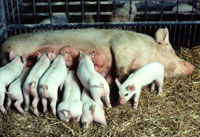fishing
-
Lice Age
Farmed salmon infect wild stocks with sea lice, study finds A new study of wild and farmed salmon in the Pacific Northwest reveals that farmed salmon breed parasitic sea lice that infect juvenile wild salmon swimming nearby and could affect stocks of other important commercial species. A Canadian research trio looked at some 5,500 young […]
-
Hook, line, and stinker?
Not long ago, PETA launched a "Fish Empathy" project. Which I'll do my very best to treat seriously here ... just for the halibut.
Citing research that shows fish communicate, feel pain, store memories, and even tend gardens, PETA is trying to convince anglers to quit. In January, after former President Carter chatted on the Tonight Show about hooking himself in the face, PETA wrote him a note: now you know how a fish feels. More recently, the organization asked Maine's Bates College to disband its fishing club; bewildered club president Chester Clem, an environmental policy major, replied, "The club is just a bunch of guys who enjoy fishing." It also petitioned my new favorite governor Dave Heineman of Nebraska to make the channel catfish, a state icon, off-limits to anglers. He declined.
The website for this campaign does include some sobering reminders about mercury contamination and the like, but it's so mixed in with the screeching and the pandering to the Christian right that it gets lost.
I'm sorry the fish are in pain. Really, I am! But somehow it's hard to get worked up about this when there are, well, bigger fish to fry.
-
Pombo eggs on mercury debate with controversial report
Pombo says: Eat up! House Resources Committee Chair Richard Pombo (R-Calif.) — longtime bete noire of the environmental community — cooked up what appears to be some fishy science in a report released last week titled “Mercury in Perspective: Fact and Fiction About the Debate Over Mercury” [PDF]. The report — written not by scientists […]
-
More windmill tilting from PETA
Do you ever feel a slight twinge of guilt when digging into a plate of baked salmon, envisioning the poor fish frolicking with its family and thinking deep thoughts? Yeah, me neither. But PETA hopes to change that. Their "Fishing Empathy" (seriously) campaign kicked off yesterday. It's built around convincing folks that fish are more intelligent than we thought (based on several recent studies). "No one would ever put a hook through a dog's or cat's mouth. Once people start to understand that fish, although they come in different packaging, are just as intelligent, they'll stop eating them," says PETA's Bruce Friedrich with that characteristic PETA blend of earnestness, hope, and slight creepiness.
Reception thus far has been, shall we say, skeptical.
-
Advice on buying aquarium fish
Dear Umbra, I’m an elementary school teacher and I’d like to get a pet fish for my classroom, but I’ve heard tales of such fish being caught by eco-egregious means: dynamite blasting, cyanide dumping, etc. How can I make sure I’m getting happy, healthy, sustainably caught fish for my aquarium? Ginger Dearest Ginger, Is nothing […]
-
Umbra on eco-friendly fish consumption
Dear Umbra, I recently turned 40 and have decided I need to pay more attention to what I eat on a daily basis. My diet has never been horrible, and I’ve always believed in all things in moderation, but a persistently elevated cholesterol level and my mortality now a smudge on the horizon have helped […]
-
The Whole Shebang
Fix Whole Ecosystem, Not Bits and Pieces, Klamath Water Report Says Both environmentalists and farmers were vindicated by a report released yesterday by the National Research Council on the contested waters of Oregon’s Klamath Basin. The report, the final and most comprehensive one in an ongoing battle over the region’s water sources, recommended sweeping repairs […]
-
Genetically modified animals could make it to your plate with minimal testing — and no public input
Last January, inspectors with the U.S. Food and Drug Administration paid a visit to the University of Illinois, where researchers have been studying the DNA of pigs. The pig project, based in Champaign-Urbana, is one of dozens of experiments being conducted across the country in which scientists are altering the genetic structure of animals in […]
